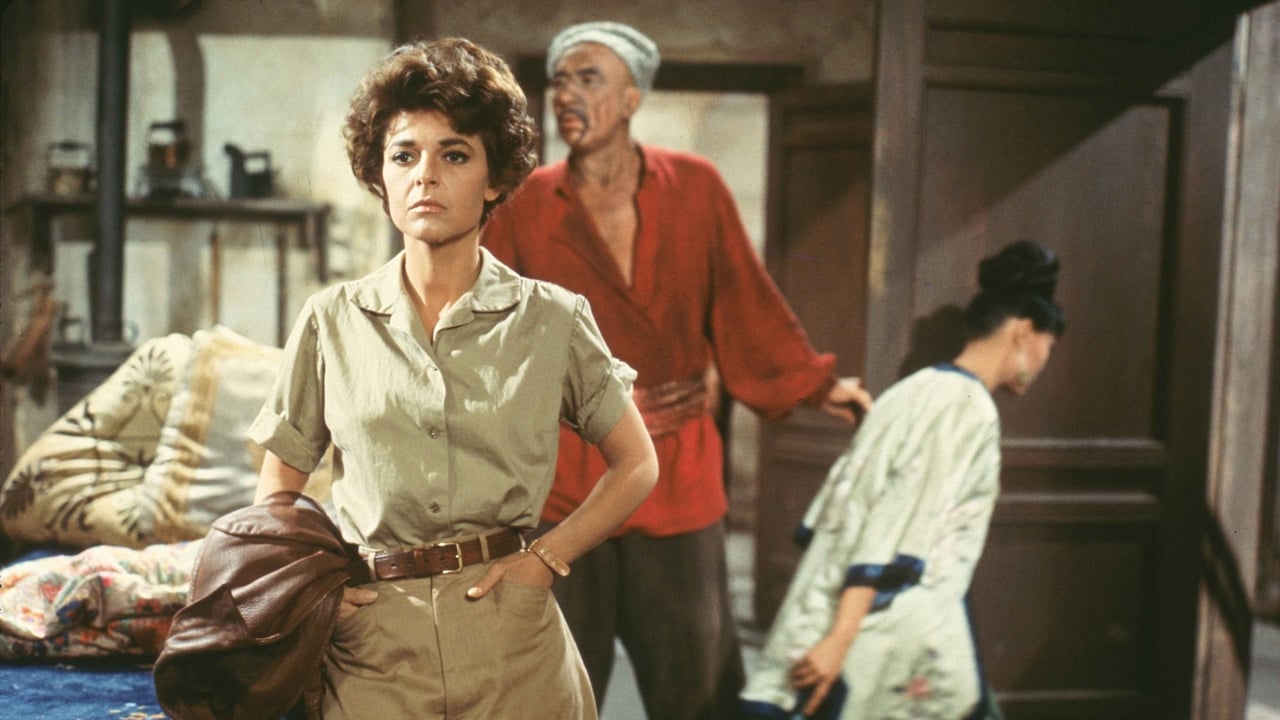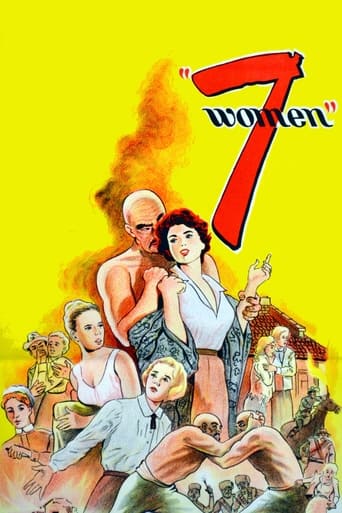

Very well executed
... View MoreThis is one of the few movies I've ever seen where the whole audience broke into spontaneous, loud applause a third of the way in.
... View MoreIt is neither dumb nor smart enough to be fun, and spends way too much time with its boring human characters.
... View MoreThis is a dark and sometimes deeply uncomfortable drama
... View MoreSeven women was John Fords last- and one of his very best color movies. Strange and beautiful - about the fate of a group of women - during the boxer rebellion in China hundred years ago. It was a kind of a swansong (1966) for him - and he was very happy (and proud) about it - but its characters might be to strange and challenging for many movie lookers?? It is at least very underrated! I hope it will change in the future, so we can buy it on DVD. The acting and all situations in the movie are appealing and absolutely astonishing!!Quotes from the review in New York Times May 5, 1966:"Imagine a bunch of isolated, pristine mission ladies captured by bloodthirsty Mongolian banditsthis, mind you, under the great director, John Ford. Add a heady, female bevy of players like Margaret Leighton, Flora Robson, Mildred Dunnock, Betty Field and, emphatically, Anne Bancroft in the role begun by the stricken Patricia Neal...Mr. Ford's picture, which gets off to a graphic, arresting start (with some ripe Elmer Bernstein music) tapers off to a stark, bony melodrama of female hysteria and mayhem...And Mr. Ford has gotten professional performances, in the main, from his tense, but transparent study of violence besetting an American mission in 1935. But the story edges to a grim, foregone conclusion, underscored by nagging, neurotic yowling, led by Miss Leighton and Miss Field...What steadies the film and almost severs it, in fact, is a sizzling, earthy performance by Miss Bancroft, as a profane hard-bitten doctor whose arrival tilts the mission even before the barbarians roar into view. Miss Bancroft, a little mannered heretofore, is simply wonderful, from her first bleak appraisal of the premises to the obvious, tragic fadeout, by which time the mission seems like an Oriental East Lynne..."
... View More"Seven Women" is the last feature film of John Ford, arguably the greatest director the United States has yet produced. After a half century of film making, Ford ended his fabled career with a wide screen feature about women in peril at a Chinese mission. Infirm and alcoholic, he filmed it on an MGM sound stage; MGM then cut it and tossed it away on the bottom half of a double bill.Today, the film is little known and seldom seen. It is far from Ford's best work, yet there is power and believability in many of the lead performances, and power in the arc of the story. Anne Bancroft shines as a feisty New York doctor who ultimately sacrifices herself to save the other missionaries -- many whom she doesn't agree with -- from brutal deaths at the hands of Chinese bandits. Her work here is more forceful and better realized than her role of Mrs. Robinson, done two years later.The best gift MGM/Sony could give lovers of serious cinema is a clean print of this forgotten film. Its sets are often glaringly artificial, and some of the secondary players are over the top (an old weakness of Ford's) as well as miscast, but "7W" is a far better film than Hollywood legend has told us.
... View MoreI have to admit that the ending of this film really stunned me. In the first part we see a female doctor, very determined, ready to work in the harsh condition. It is hard to her to be female doctor, she couldn't even get the decent office back in her country. The title of the film is "7 women", but actually there are 8. Why? It seems that the main character is excluded. Is that for the fact she wears man's clothes, drinks and smokes and most importantly that she is a doctor? In our society it is considered a compliment when the woman is told she was like a man (brave like a man, determined like a man, has brain like a man..) even today. But, despite her man's clothes she looks more appealing than the rest of women in their all women clothes who look like dry broomsticks.From today's point of view it is inappropriate for the doctor to smoke so much and even get mad when is told not to, but as we know in the past women were not allowed to smoke, not for health reason, but only for the fact they were women, we could see it as her rebellion against this attitude.For all the above the ending came as surprise. I think that Ford made for the main character a typical female destiny. Something like that: Dear ladies, you could try to be like a man, but in the end you couldn't avoid your female destiny. Is this a bottom line of the film? Later we see her dressed like a geisha. How sad to see her in that outfit when we know how she loves to wear man's clothes for practical reason. If the main character was a man,I am sure Ford would intend for him typical man's (male's)ending. He would fight to the last drop of his blood even if it would be hopeless. What is the point of her sacrifice? She saved 8 lives, but with her determination and skill as a doctor she could have saved 8 thousands lives if she had stayed alive. Also it was not pleasant to see Chinese depicted as brutes with disgusting eating habits who mumble instead of talking. Obviously some see the world like this: We are in the middle and the rest of the world is made of savages, brutes who constantly fight with each other. I'm sure this wasn't Ford intention; he just followed the pattern. Nevertheless, it is a good film, which makes you think.
... View MoreI wonder what feminists feel about this film. I found this work to be a fascinating look at women by a male director that can compare with two other cinematic works: Paul Mazursky's "The Unmarried Woman" and Muzaffar Ali's "Umrao Jaan". Strong women, weak women, lesbians, and immature girls, are contrasted with cardboard male characters that are never fully developed and are obviously no match to the array of women portrayed in the film. The men are painted so negatively that one begins to wonder if Ford thought Asian men had more brawn than brain--a strange view that has gained currency in Hollywood cinema.I applaud Ford's decision to cast Anne Bancroft in this role. This is one of her strong performances. She makes even the most vapid films look elegant with her roles ("Lipstick", "Little Nikita", to name just two). Ford develops her role "7 women" on the lines of a Western gunslinger--only there are no gunfights. The woman has a weapon: sex. That weapon can down all the bad guys faster than it takes to down Mexicans, Red Indians, rustlers, bank-robbers. In this film these bad men are Chinese/Mongolian thugs. Established thespians Dame Flora Robson and Margaret Leighton are totally eclipsed by Bancroft's riveting performance.What Ford wanted I guess was to stun the viewer with the ending--the twist preceded by the gradual softening of the Bancroft in men's clothes to the Bancroft in women's clothes and the acceptance of male superiority. Most critics have found the end facile but I found the end was powerful as it makes you review and reconsider the strength of the lead character.The film questions established views on religion; evidently Ford was old enough to have seen enough to choose to make this film in the evening of his life. In his films, Ford's women are as interesting as any other aspect of his cinema and this film provides ample fodder for those interested in studying this element of Ford's work.However, for a 1966 film, the studio sets for the film look too artificial for the serious cinema the film offers. If anything, the film makes the viewer think!
... View More